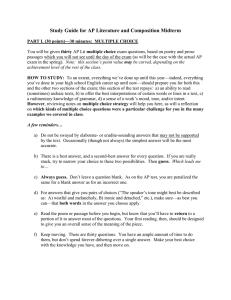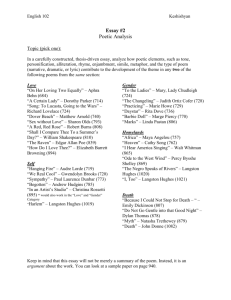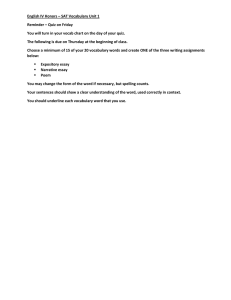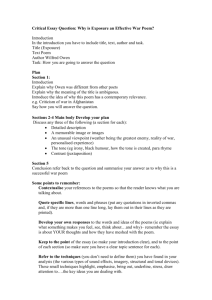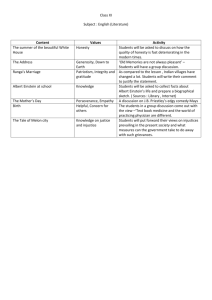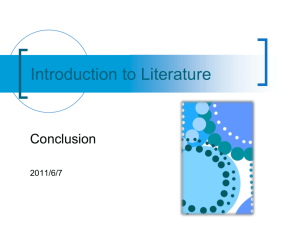Since There's No Help
advertisement
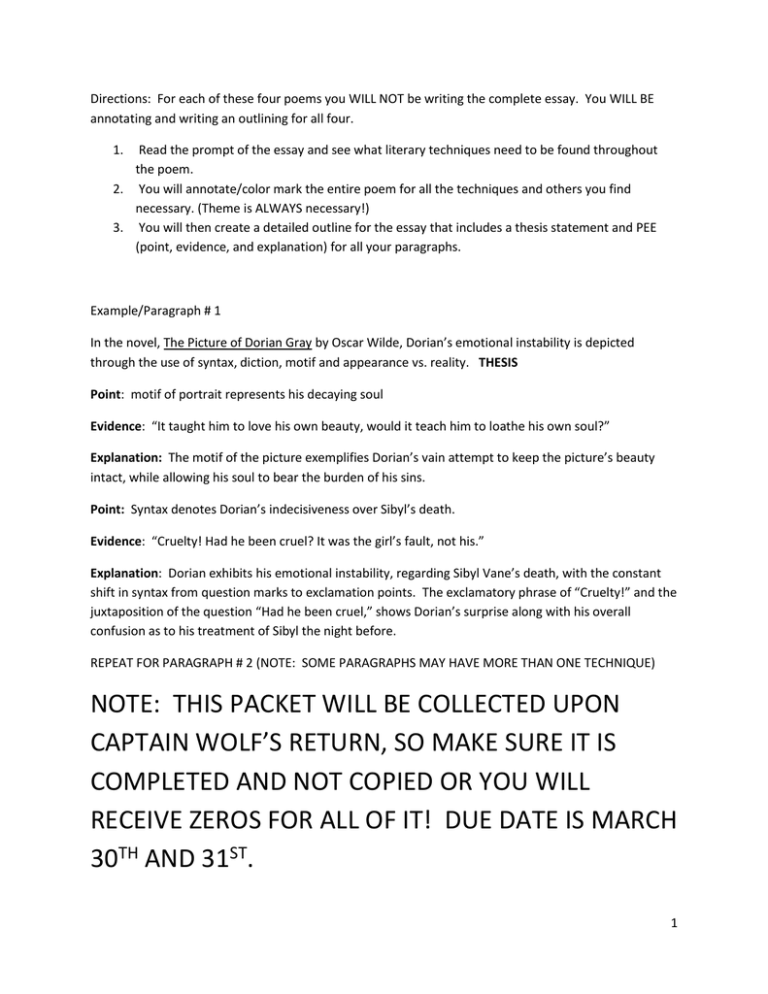
Directions: For each of these four poems you WILL NOT be writing the complete essay. You WILL BE annotating and writing an outlining for all four. 1. Read the prompt of the essay and see what literary techniques need to be found throughout the poem. 2. You will annotate/color mark the entire poem for all the techniques and others you find necessary. (Theme is ALWAYS necessary!) 3. You will then create a detailed outline for the essay that includes a thesis statement and PEE (point, evidence, and explanation) for all your paragraphs. Example/Paragraph # 1 In the novel, The Picture of Dorian Gray by Oscar Wilde, Dorian’s emotional instability is depicted through the use of syntax, diction, motif and appearance vs. reality. THESIS Point: motif of portrait represents his decaying soul Evidence: “It taught him to love his own beauty, would it teach him to loathe his own soul?” Explanation: The motif of the picture exemplifies Dorian’s vain attempt to keep the picture’s beauty intact, while allowing his soul to bear the burden of his sins. Point: Syntax denotes Dorian’s indecisiveness over Sibyl’s death. Evidence: “Cruelty! Had he been cruel? It was the girl’s fault, not his.” Explanation: Dorian exhibits his emotional instability, regarding Sibyl Vane’s death, with the constant shift in syntax from question marks to exclamation points. The exclamatory phrase of “Cruelty!” and the juxtaposition of the question “Had he been cruel,” shows Dorian’s surprise along with his overall confusion as to his treatment of Sibyl the night before. REPEAT FOR PARAGRAPH # 2 (NOTE: SOME PARAGRAPHS MAY HAVE MORE THAN ONE TECHNIQUE) NOTE: THIS PACKET WILL BE COLLECTED UPON CAPTAIN WOLF’S RETURN, SO MAKE SURE IT IS COMPLETED AND NOT COPIED OR YOU WILL RECEIVE ZEROS FOR ALL OF IT! DUE DATE IS MARCH 30TH AND 31ST. 1 In each of the following poems, written about seventy years apart, the speaker comments on the phenomenon of forgetfulness. Read the poems carefully and then, in a well-organized essay, summarize each speaker’s thoughts and analyze how the tone, imagery, sentence structure, or other poetic elements help to convey each speaker’s state of mind. Forgetfulness Forgetfulness is like a song That, freed from beat and measure, wanders. Forgetfulness is like a bird whose wings are reconciled, Outspread and motionless, -A bird that coasts the wind unwearyingly. Forgetfulness is rain at night, Or an old house in a forest, -- or a child. Forgetfulness is white, -- white as a blasted tree, And it may stun the sybil into prophecy, Or bury the Gods. I can remember much forgetfulness. Harold Hart Crane Forgetfulness By Billy Collins The name of the author is the first to go followed obediently by the title, the plot, the heartbreaking conclusion, the entire novel which suddenly becomes one you have never read, never even heard of, as if, one by one, the memories you used to harbor decided to retire to the southern hemisphere of the brain, to a little fishing village where there are no phones. Long ago you kissed the names of the nine muses goodbye and watched the quadratic equation pack its bag, and even now as you memorize the order of the planets, something else is slipping away, a state flower perhaps, the address of an uncle, the capital of Paraguay. Whatever it is you are struggling to remember, it is not poised on the tip of your tongue or even lurking in some obscure corner of your spleen. 2 It has floated away down a dark mythological river whose name begins with an L as far as you can recall well on your own way to oblivion where you will join those who have even forgotten how to swim and how to ride a bicycle. No wonder you rise in the middle of the night to look up the date of a famous battle in a book on war. No wonder the moon in the window seems to have drifted out of a love poem that you used to know by heart. 3 Read the following poem carefully, paying particular attention to the personalities of the two neighbors. Then write well-organized essay in which you explain how the speaker conveys not only the differences between himself and his neighbor but the implications of those differences. You may wish to include analysis of such poetic elements such as diction, tone, figurative language, and imagery, among others. Mending Wall Robert Frost, 1874 - 1963 Something there is that doesn’t love a wall, That sends the frozen-ground-swell under it, And spills the upper boulders in the sun; And makes gaps even two can pass abreast. The work of hunters is another thing: I have come after them and made repair Where they have left not one stone on a stone, But they would have the rabbit out of hiding, To please the yelping dogs. The gaps I mean, No one has seen them made or heard them made, But at spring mending-time we find them there. I let my neighbor know beyond the hill; And on a day we meet to walk the line And set the wall between us once again. We keep the wall between us as we go. To each the boulders that have fallen to each. And some are loaves and some so nearly balls We have to use a spell to make them balance: ‘Stay where you are until our backs are turned!' We wear our fingers rough with handling them. Oh, just another kind of outdoor game, One on a side. It comes to little more: There where it is we do not need the wall: He is all pine and I am apple orchard. My apple trees will never get across And eat the cones under his pines, I tell him. He only says, ‘Good fences make good neighbors.' Spring is the mischief in me, and I wonder If I could put a notion in his head: 'Why do they make good neighbors? Isn’t it Where there are cows? But here there are no cows. Before I built a wall I’d ask to know What I was walling in or walling out, And to whom I was like to give offense. Something there is that doesn’t love a wall, That wants it down.' I could say ‘Elves’ to him, But it’s not elves exactly, and I’d rather He said it for himself. I see him there Bringing a stone grasped firmly by the top In each hand, like an old-stone savage armed. He moves in darkness as it seems to me, Not of woods only and the shade of trees. He will not go behind his father’s saying, And he likes having thought of it so well He says again, ‘Good fences make good neighbors.' 4 Carefully read the following poem. Then, in a well-organized essay discuss the techniques the poet uses to convey is attitude toward the character in the poem. You may wish to analyze the poet’s use of imagery, choice of details, and tone, among other poetic elements. Determination By Stephen Dobyns Cabbage—the first word put down with his new pen, a trophy pen, like a trophy wife, not cheap, absurd to use a ballpoint pen for a task like this, a challenge, for which he’d also bought a new, but ancient, rolltop desk recently restored, with matching chair, also not cheap, and for which he’d renovated the attic room with pine-panelled walls, bookshelves, and good light for his new office or weekend office, a place planned for many years, even before college, back in high school in fact, a resolve rare in his life, but about which he’d dreamed in free moments at his office, and which kept him sane during those tedious years of doing the taxes of strangers, but now at last begun, excitingly begun, as he leaned forward with pen raised to put down on paper the first word of his first novel. 5 Read the following sonnet carefully. Then, in a well-organized essay, analyze the techniques the poet uses to develop the dramatic structure in the poem. Comment on the title, tone, figurative language, rhythm, or any other appropriate poetic elements. Since There's No Help Since there's no help, come, let us kiss and part, Nay, I have done, you get no more of me, And I am glad, yea, glad with all my heart, That thus so cleanly I myself can free. Shake hands for ever, cancel all our vows, And when we meet at any time again Be it not seen in either of our brows That we one jot of former love retain. Now at the last gasp of Love's latest breath, When, his pulse failing, Passion speechless lies, When Faith is kneeling by his bed of death, And Innocence is closing up his eyes, Now, if thou wouldst, when all have giv'n him over, From death to life thou might'st him yet recover. Michael Drayton 6
